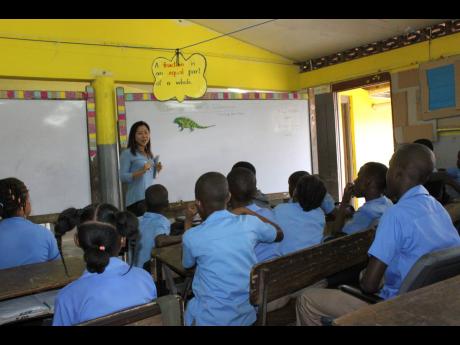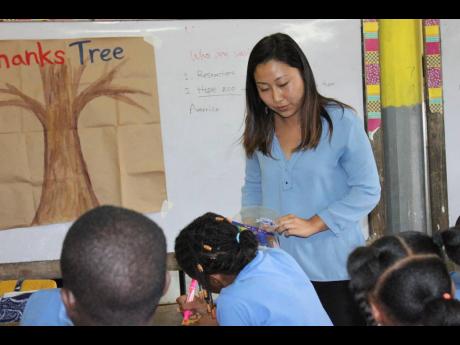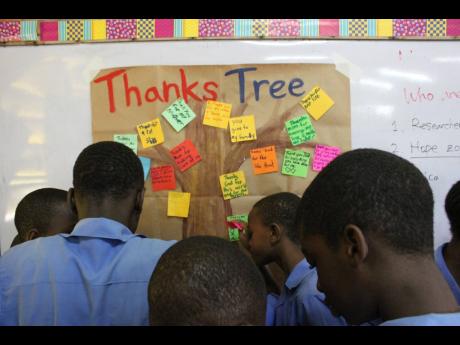In harmony with nature
Mao Hosaka has perhaps done it all – from delving into the uber megapixels of animation in Tokyo, finding eternal bliss meditating in a temple in Thailand, to kicking up a storm as she brushed up her Muay Thai (Thai boxing) skills, learning Bahasa (the official language of Indonesia), and climbing Mount Kilimanjaro.
“Even though the work experience didn’t last long, it made me realise that this kind of life in a big city was not for me,” she said. “Since then I started looking for something that I’m passionate about, something I’m happy doing as a part of my life.”
In her quest for finding purpose and meaning, Hosaka travelled to Zimbabwe and also volunteered in a wildlife conservation programme in South Africa.
Now a Japan International Cooperation Agency volunteer in Environmental Education at Manchester 4-H Club, she is travelling to over 30 schools across Manchester and Clarendon to teach primary school students.
“I was also happy to hear that I got my wish to be sent here to Jamaica,” she said.
But, Hosaka professes, as a first time teacher, facing a bunch of primary school children, might be the most challenging adventure (if we can use this term) of them all.
“They (the students) can be noisy and at times they don’t listen,” Hosaka said.
“But,” she continued. “They are kind and respectful.” Meditation and kick-boxing just had a confluence.
It is a gratifying experience nonetheless, Hosaka says, to teach the children about environment, how to preserve and save it, use of best practices and critically having tangible knowledge of the flora and fauna.
Important to know
The lesson for the day at Morgan’s Forest Primary School in Clarendon was to talk about the Jamaican Iguana.
“It is important for the children to know about the animals, and how they are critical to the environment,” she said.
In the class, Hosaka laid down charts, photos, and an assortment of the coloured white board markers as she started to talk about the Jamaican Iguana, its habitat, and its place in the eco-system.
This lesson was coupled with questions on why is it necessary to keep the surroundings clean, which were enthusiastically answered by the students – their decibels switching crests and troughs as Hosaka kept pace with the energy levels.
During the course of her class, she reiterated the importance of being kind towards living beings, especially animals.
Lessons in Environmental Studies were complemented with life lessons – that of being compassionate and thankful.
“For me,” she said. “Teaching about environment brings people to have a deeper compassion to other creatures and nature; this is why I love what I do at Manchester 4-H Clubs.”
Hosaka informed that in High Schools, she teaches the Takakura compost method in agriculture classes. In the Takakura composting method, organic waste is broken down by micro-organisms that are cultivated from local materials. The method involves making seed compost from fermented solutions and fermenting bed. Organic waste is mixed with the seed compost and left to degrade in a ventilated container or basket.
“However, most of my time is spent teaching in Primary schools,” she said. “I teach about ‘How sea animals suffer from littering and throwing waste materials in sea’, ‘using your senses to enjoy nature’ and ‘affects of deforestation’, among others.”
Lessons in recycling
Recycling and repurposing are also areas where Hosaka is educating students and adults. “Plastic bottle separation is one of my projects in schools and the offices I visit,” she said. “It started slowly but now people are more aware about recycling and how it helps the environment.”
Apart from teaching environment, she would sometimes teach Japanese language and culture.
In the class, after learning about Iguana, Hosaka stuck a chart with a ‘Thanks Tree’, each student was given a sticky note papers, and asked to write two things that they are thankful for – from giving thanks to God for His creations to expressing gratitude to their parents - they obliged and shared their feelings on paper which were stuck on the ‘tree’.
For Hosaka, it is these moments that give her gratification.
“I am really thankful for this wonderful opportunity,” she said. “To be an environmental educator in a country blessed with nature, and people who have been supporting me with cheerful smiles, it is a wonderful experience.”
To this young JICA volunteer and all those who have embraced the spirit of volunteerism to bring humanity a tad bit closer to each other - ‘ terima kasih’ (Thank you in Bahasa - a compound word (terima - receive, kasih - love).




